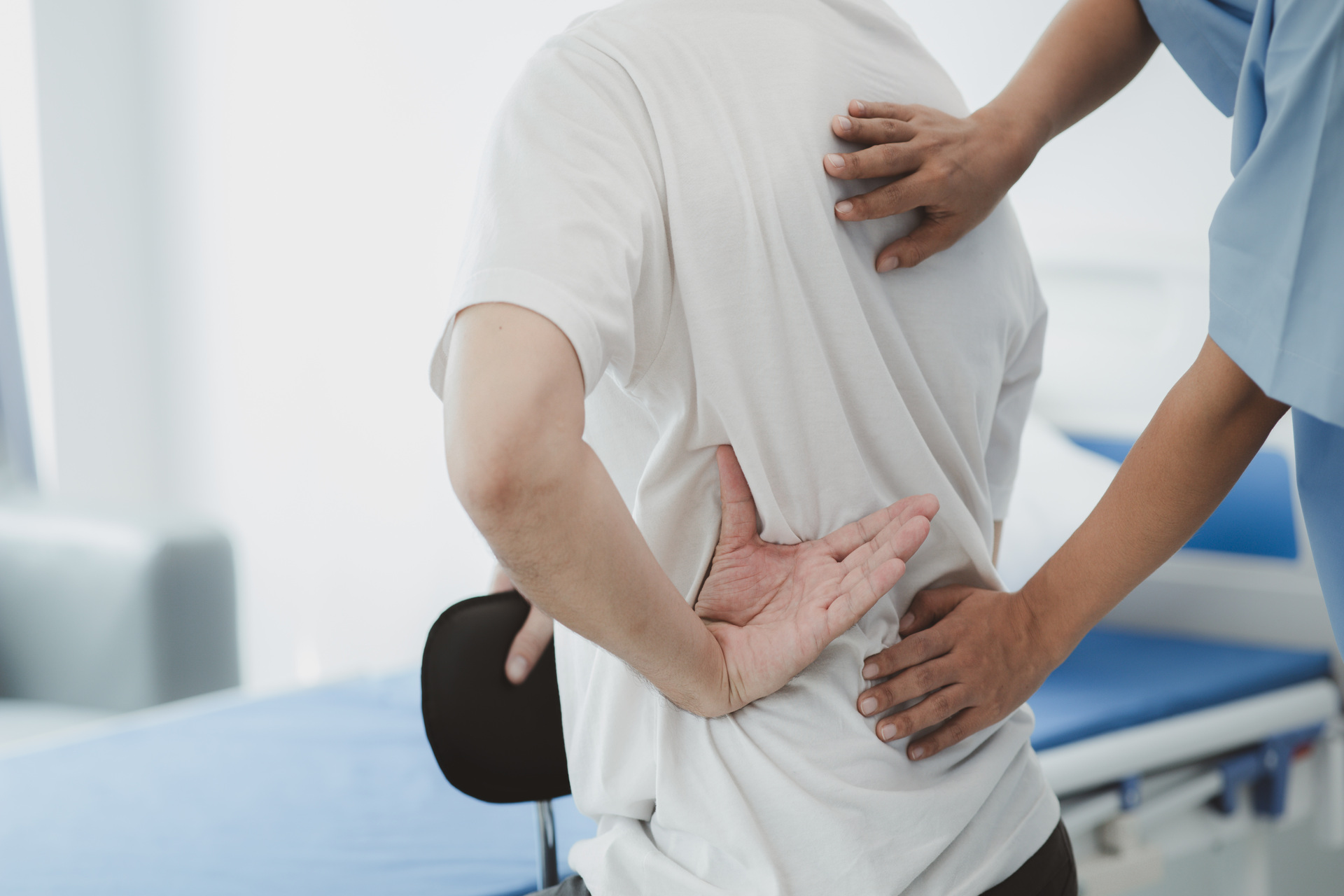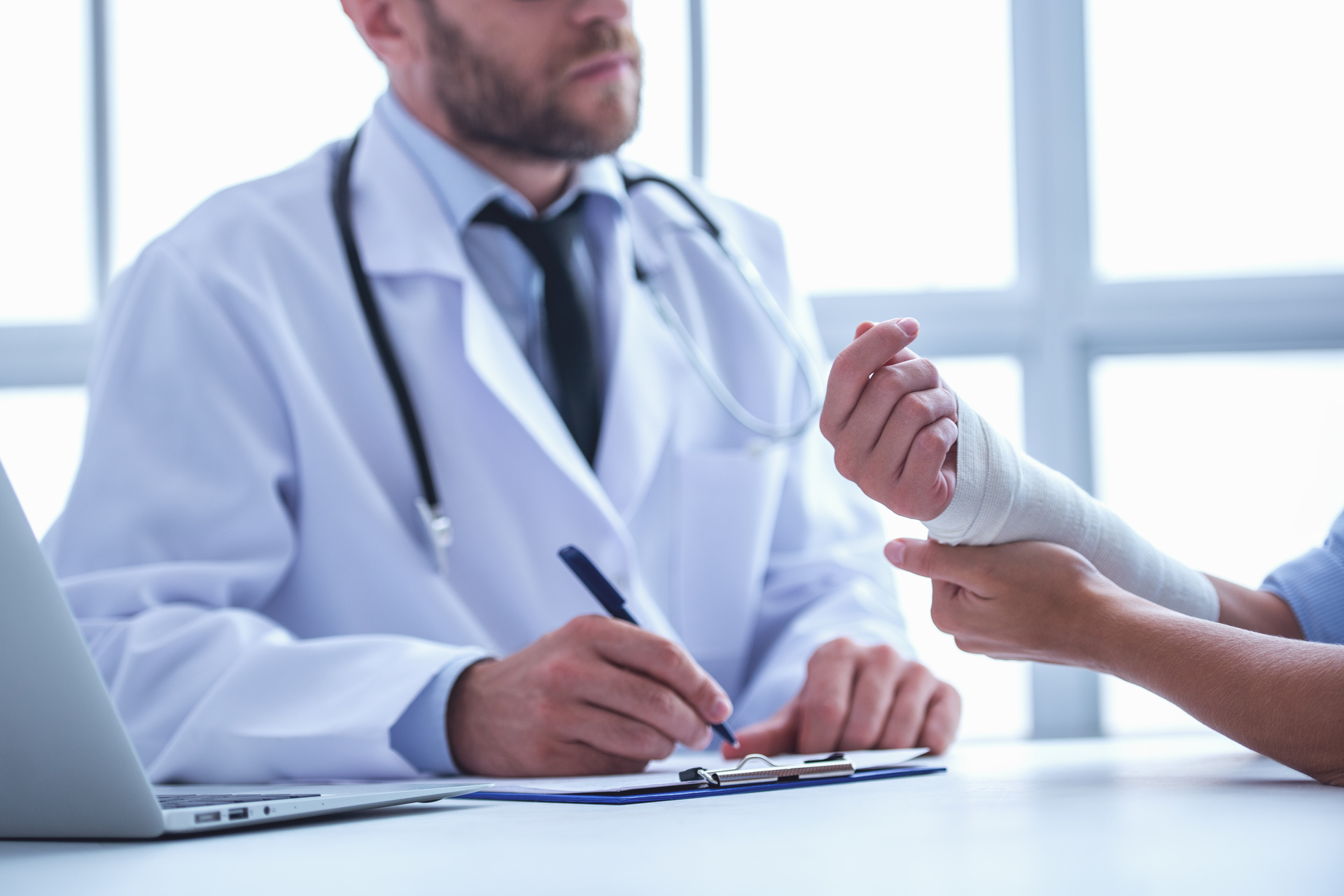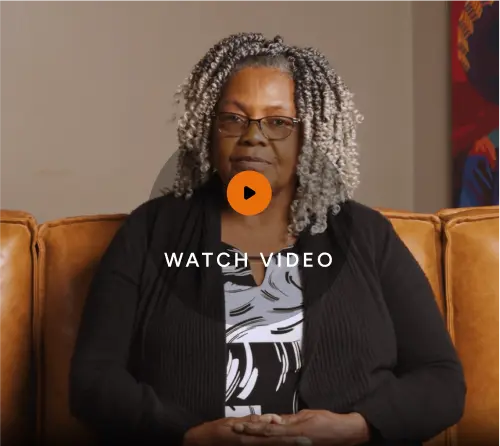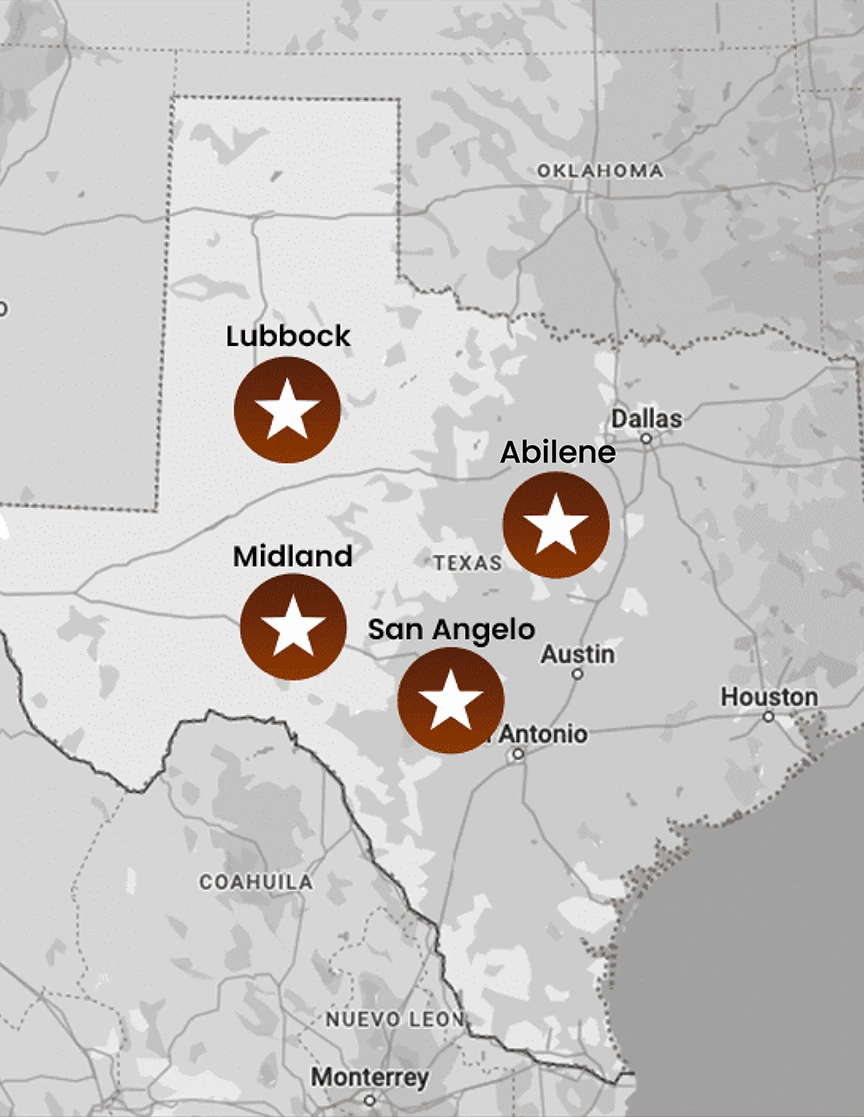Car accidents can cause a wide range of injuries, some appearing immediately, while others may take hours or even days to develop. Recognizing early symptoms is necessary for getting medical care and documenting injuries for potential legal claims.
Ignoring symptoms could lead to long-term complications, making it essential to seek medical attention even if you feel fine.
At Keith & Lorfing, we have over 150 years of combined experience, 500 trials under our belt, and were voted Best Lawyers in Abilene in 2023 & 2024. We only hire the most experienced and credentialed attorneys, ensuring accident victims get the representation they deserve.
If you experience any of these symptoms, consult a doctor and contact a car accident attorney to protect your health and legal rights.

Schedule a free consultation with our Abilene car accident attorneys today.
Immediate vs. Delayed Symptoms
A car accident injury can appear in different ways—some symptoms show up immediately, while others take days or weeks to develop. Immediate symptoms often signal underlying injuries that may require treatment.
- Pain and swelling: Impact can cause muscle, ligament, or joint injuries. Ice may help, but a medical provider should rule out fractures or soft tissue damage.
- Dizziness and confusion: A sudden jolt can lead to a concussion or head trauma. Even minor head injuries may cause lifelong complications if untreated.
- Visible injuries: Cuts, bruises, and abrasions may indicate deeper tissue damage. Deep wounds may require stitches to prevent infection.
- Neck injuries and stiffness: Whiplash can cause pain, limited movement, and headaches. Symptoms may worsen and require physical therapy.
- Paralysis or loss of sensation: Severe spinal cord damage can lead to temporary or permanent paralysis, requiring immediate medical attention.
Delayed symptoms can signal serious conditions masked by adrenaline and shock after an accident. These should never be ignored.
- Headaches and internal pain: Concussions or brain bleeds may take days to appear. Persistent headaches require urgent medical evaluation.
- Cognitive issues and memory problems: Difficulty concentrating, forgetfulness, or mood swings can indicate a traumatic brain injury (TBI).
- Back pain and stiffness: Spinal injuries like herniated discs or nerve compression may worsen over time and require medical imaging and therapy.
- Emotional distress and PTSD: Anxiety, depression, or PTSD can develop after a traumatic accident and may require mental health support.
- Numbness or tingling: Nerve damage may cause weakness or loss of sensation in the limbs, which needs immediate evaluation.
🚨 Adrenaline and shock can delay pain, making some injuries appear later and potentially causing lifelong complications. Seeking medical care as soon as possible can help recover and protect your personal injury protection (PIP) claim.
10 Most Common Car Accident Symptoms
Car accidents can cause a wide range of injuries, some of which appear immediately, while others may take days or even weeks to develop. Recognizing these common car accident injuries early can help prevent complications and ensure you receive the treatment options you need.
Below are 10 symptoms you should look out for after a car crash, along with when to seek medical attention.
Headaches
Headaches after a car accident may indicate a concussion, traumatic brain injury (TBI), or whiplash. They can be caused by the forceful impact of the accident, leading to brain swelling, nerve damage, or muscle tension in the neck and shoulders.
Common causes:
- Rear-end collisions that cause the head to snap forward and back.
- High-impact crashes that jolt the brain inside the skull.
- Even minor accidents where the body absorbs sudden force.
When to seek help:
- Severe headaches, nausea, dizziness, or confusion may indicate head trauma.
- Headaches that worsen over time can signal internal bleeding or a TBI.
- If pain persists for days to weeks, seek immediate medical attention.
Neck Pain & Whiplash
Whiplash occurs when the head is suddenly jerked forward and backward, causing strain on the neck muscles and ligaments. This common symptom often leads to stiffness, pain, and dizziness. If you’re wondering how much compensation you may be entitled to, learn more about the average whiplash settlement in Texas and average settlement for a car accident back and neck injury in Texas.
Common causes:
- Rear-end accidents, especially at high speeds.
- Sudden stops that cause rapid head movement.
- Seatbelt restraint that prevents torso movement but allows neck strain.
When to seek help:
- Limited range of motion, persistent stiffness, or chronic pain.
- Severe dizziness or numbness in the arms or shoulders.
- Pain that worsens instead of improving over time.
Back Pain
Back pain after an accident may indicate spinal injuries, herniated discs, or soft tissue damage. Pain may be localized or radiate down the legs, which could signal nerve damage.
Common causes:
- High-impact crashes that place strain on the spine.
- T-bone or side collisions that cause the body to twist unnaturally.
- Rear-end collisions leading to whiplash, affecting the lower back.
When to seek help:
- Sharp pain radiating down the legs (could indicate a pinched nerve).
- Persistent stiffness or difficulty moving.
- Sudden weakness or numbness, which may signal spinal cord damage.

Numbness & Tingling
Numbness or tingling after a car accident can help identify nerve damage, pinched nerves, or spinal cord injuries.
Common causes:
- Whiplash or back injuries compressing spinal nerves.
- Herniated discs pressing against nerve roots.
- Head injuries affecting brain signals to the limbs.
When to seek help:
- Tingling that spreads or worsens over time.
- Loss of sensation or weakness in the arms or legs.
- Difficulty walking or performing normal tasks.
Shoulder & Joint Pain
Joint pain, especially in the shoulders, knees, and elbows, occurs when the body impacts seatbelts, airbags, or vehicle interiors.
Common causes:
- Seatbelt pressure across the chest and shoulders.
- Bracing for impact, leading to rotator cuff injuries.
- Direct impact with the dashboard or steering wheel.
When to seek help:
- Pain that doesn’t improve or worsens over time.
- Limited mobility or inability to lift the arm.
- Visible swelling or bruising around the joint.
Chest Pain
Chest pain may indicate bruised ribs, internal bleeding, or even heart-related trauma following a severe accident.
Common causes:
- Seatbelt syndrome, where the belt compresses the chest on impact.
- Direct collision with the steering wheel or dashboard.
- Internal injuries that aren’t visible immediately.
When to seek help:
- Severe chest pain or difficulty breathing (possible broken ribs or lung damage).
- Pain radiating to the arms, neck, or jaw (could indicate a heart injury).
- Deep bruising that worsens over time.
Abdominal Pain & Internal Bleeding
Internal organ damage, ruptured spleen, or internal bleeding can cause deep, persistent abdominal pain.
Common causes:
- Blunt force trauma from seatbelts or steering wheels.
- High-speed collisions causing organ displacement.
- Rollover crashes leading to compression injuries.
When to seek help:
- Swelling, dizziness, or fainting may indicate serious internal bleeding.
- Deep bruising with tenderness around the abdomen.
- Blood in vomit, urine, or stool (signs of severe internal injuries).
Memory Loss & Cognitive Issues
Memory problems after an accident can be a sign of traumatic brain injury (TBI) or concussion.
Common causes:
- Head injuries caused by impact with airbags, windows, or steering wheels.
- Severe whiplash affecting brain function.
- Oxygen deprivation due to internal injuries.
When to seek help:
- Persistent confusion, mood swings, or trouble concentrating.
- Difficulty remembering the accident or recent events.
- Changes in speech or difficulty forming sentences.
PTSD & Emotional Trauma
Post-Traumatic Stress Disorder (PTSD) can develop after a traumatic event like a serious car accident.
Common causes:
- Accidents involving fatalities or severe injuries.
- Experiencing life-threatening moments during a crash.
- Emotional distress from permanent disabilities or lost loved ones.
When to seek help:
- Flashbacks, nightmares, or extreme anxiety while driving.
- Depression or mood changes that persist for weeks.
- Difficulty sleeping or avoiding car rides altogether.
Swelling & Bruising
Swelling and bruising may appear immediately or days after a crash and could indicate deep tissue injuries or fractures.
Common Causes:
- Seatbelt compression injuries across the chest and abdomen.
- Impact with the car interior, steering wheel, or airbag.
- Blood vessel damage from blunt force trauma.
When to seek help:
- Rapid swelling, especially near joints.
- Worsening bruising, which may indicate internal bleeding.
- Pain that does not improve with rest or ice.
Not sure if you have a case? Our car accident attorneys can assess your symptoms, review medical records, and determine the best legal path forward. Contact us today!
When to See a Doctor After a Car Accident
Many people assume that if they don’t feel immediate pain after a car accident, they are unharmed. However, adrenaline and shock can delay pain signals, masking injuries that may take hours or even days to appear.
Seeking medical attention as soon as possible helps prevent complications, ensures proper documentation for legal claims, and protects your right to compensation.
| Symptom Type | Examples | Recommended Action |
|---|---|---|
| Immediate Symptoms | Severe pain, loss of consciousness, difficulty breathing | Go to the ER immediately |
| Delayed Symptoms | Headaches, numbness, dizziness, emotional distress | See a doctor within 24-72 hours |
| Persistent Symptoms | Chronic pain, cognitive issues, limited mobility | Follow up with specialists |
| No Immediate Symptoms | Feeling “fine” but later developing pain | Schedule a precautionary check-up |
Now, let’s break this table down more to help you determine when you should seek medical advice for your accident-related injuries.

Immediate ER Visit – When Urgent Care Is Needed
Some injuries require emergency care because they can become life-threatening if untreated. If you experience any of the following, go to the ER right away.
- Severe pain that worsens instead of improving
- Loss of consciousness or memory gaps, which can indicate a traumatic brain injury
- Difficulty breathing, chest pain, or irregular heartbeat, which may be caused by internal injuries, rib fractures, or even cardiac trauma
- Sudden weakness, paralysis, or difficulty moving limbs, which could signal spinal cord damage and may cause permanent disability if untreated
- Deep bruising, swelling, or abdominal pain, which may indicate internal bleeding or organ damage
Example scenario: A client was involved in a low-speed rear-end collision. Initially, he felt fine, but within an hour, he experienced severe dizziness and a throbbing headache. A hospital scan confirmed a concussion and minor brain bleeding, which could have been life-threatening if he had ignored his symptoms.
The Centers for Disease Control and Prevention (CDC) states that TBIs can occur even in minor crashes and that symptoms may not appear immediately.
Delayed Symptoms – Why Even Mild Symptoms Should Be Checked
Not all injuries are immediately visible after an accident. Some symptoms may take days or even weeks to develop, making it best to follow up with a doctor even if you feel fine.
- Headaches that develop hours or days later may indicate whiplash, a concussion, or a brain bleed.
- Neck or back pain could signal herniated discs, nerve compression, or spinal misalignment.
- Numbness or tingling in your limbs could be a sign of nerve damage or a pinched spinal cord.
- Unexplained mood swings, anxiety, or trouble concentrating could point to post-traumatic stress disorder or a mild traumatic brain injury.
- Persistent swelling or bruising that appears later may indicate deep tissue injuries or internal bleeding.
Imagine you’re in a T-bone accident at an intersection. You feel fine at first, but two days later, you wake up with severe neck stiffness and pain radiating down your back. This could mean a delayed whiplash injury or spinal damage, which, if left untreated, could lead to chronic pain and mobility issues.
Additional reading: should I get a lawyer for a minor car accident in Texas
Medical Documentation – Why It’s Critical for Legal Claims
Appropriate medical documentation ensures you receive the treatment you need and strengthens your personal injury claim.
- A prompt medical evaluation directly links your injuries and the accident, making it harder for insurers to deny your claim.
- Doctor’s notes, diagnostic tests, and imaging scans help determine the severity of your injuries and potential long-term effects.
- Medical records document the cost of treatment, ensuring that you can seek full compensation for your damages.
🚨 Seeing a doctor after a car accident is critical for your recovery and legal case. Even if you feel fine, a medical evaluation can identify hidden injuries and ensure you get the necessary treatment.

How our Lawyer Can Help After a Car Accident
Dealing with a car accident is never easy, especially when medical bills, lost wages, and insurance companies start piling on the pressure. Many firms focus on big cities like Dallas, Houston, San Antonio, or Austin, but our law firm is dedicated to West Texas.
Our team has deep roots in the region, giving us an unmatched knowledge of local courts, judges, and legal processes. We take on the fight so you don’t have to.
- Medical bills and compensation: We help recover costs for hospital stays, doctor visits, physical therapy, and future medical treatment
- Lost wages: If your injuries keep you from working, we fight to recover lost income, including future lost earnings, if you can’t return to your job
- Pain and suffering: We seek compensation for emotional distress, reduced quality of life, and ongoing physical pain caused by the accident
- Insurance negotiation: We handle all communication with insurers to prevent them from offering lowball settlements or delaying your claim
- Legal action if necessary: If the insurance company refuses to offer a fair settlement, we are prepared to take your case to court
- West Texas experience: Unlike firms that focus on big cities, we exclusively serve West Texas, with offices in Abilene, Lubbock, Midland, and San Angelo
- Local legal knowledge: Our former law partners are now judges and district attorneys in West Texas, giving us an inside familiarity of the legal system.
Contact Our Texas Car Accident Lawyers Today
A car accident can turn your life upside down, but you don’t have to deal with it alone. Our team stands up for West Texans, making sure you get the medical care, financial support, and justice you deserve. Whether it’s negotiating with insurance companies or taking your case to court, we’re here to handle the fight so you can focus on healing. If you’re unsure whether legal representation is right for you, find out is it worth getting an attorney for a car accident in Texas and how our lawyer can protect your best interests.
Call us at 325-241-9286 or schedule a free consultation with our team by filling out our contact form.

Our Conclusion
Recovering from a car accident isn’t just about healing physically—it’s about securing the support you need to move forward. Getting the right medical care, knowing what to expect after a car accident, and working with an experienced legal team can make all the difference.
A strong case will allow you to recover compensation for your medical bills, lost wages, and the lasting impact of your injuries. If you’re dealing with pain, hidden injuries, or financial stress, our firm will help you identify your legal options and fight for the compensation you deserve.



